SIBBM 2025 • Frontiers in Molecular Biology
SIBBM 2025 • Frontiers in Molecular Biology
Molecular drivers and targets in development and disease
Molecular drivers and targets in development and disease
Naples, Italy • 17-19 June 2025
Naples, Italy • 17-19 June 2025
SIBBM 2025 • Frontiers in Molecular Biology
Molecular drivers and targets in development and disease
Naples, Italy • 17-19 June 2025
Reset, Reimagine, Reframe
Reset, Reimagine, Reframe
Dear Colleagues,
We are thrilled to invite you to the second edition of the Early Career SIBBM (EC-SIBBM) pre-meeting, scheduled for June 16-17 in Naples, Italy.
EC-SIBBM aims to bring together early-career researchers, providing a supportive environment for the progression of their scientific journeys. The goal is to foster communication and networking skills within the scientific community while offering a friendly and stimulating platform for participants to showcase their research.
The event will serve as a springboard for discussions on growth opportunities and provide guidance for navigating both academic and industry research career paths.
Key Information:

by Edoardo Sozzi
Lucia Altucci
(University of Campania L. Vanvitelli)
Domenico Aprile
(University of Campania L. Vanvitelli)
Ugo Chianese
(University of Campania L. Vanvitelli)
Nunzio Del Gaudio
(University of Campania L. Vanvitelli)
Giovanni Di Bernardo
(University of Campania L. Vanvitelli)
Daniela Di Girolamo
(University of Naples Federico II)
Alessandro Fiorenzano
(University of Naples Federico II)
Nicola Mosca
(University of Campania L. Vanvitelli)
Chiara Papulino
(University of Campania L. Vanvitelli)
Monday, 16 June |
|
|---|---|
| 9:00-9:50 | Registration |
| 9:50-10:00 | Opening |
|
Session I – Experimenting with Your Career: Academia, Industry, Startups, Core Facilities... Chairs: Nunzio Del Gaudio, Daniela Di Girolamo, Ugo Chianese |
|
| 10:00-10:20 |
Orsola Di Martino (University of Parma) Leveraging international experience to achieve academic excellence in Italy |
| 10:20-10:40 |
Luigi Fattore (IRCCS Regina Elena Institute, Rome) My Journey in the lab and in life with my tiny invisible friends: MicroRNAs |
| 10:40-11:00 |
Rocchio Francesca (Dompè farmaceutici S.p.A.) From basic to translational research an insight into a scientific journey |
| 11:00-11:30 | Coffee break |
| 11:30-11:50 |
Onelia Gagliano (University of Padua) From reprogramming to organoids: engineering complexity in 3D |
| 11:50-12:10 |
Ortensia Ilaria Parisi (Macrofarm Spinoff, University of Calabria) From research to market: unlocking the potential of Technology Transfer |
| 12:10-12:30 |
Emanuele Sasso (University of Naples Federico II) From Academia to Biotech and back: a journey in fostering synergies for success |
| 12:30-12:50 |
Chiara Papulino (Circe Spinoff, University of Campania L. Vanvitelli) From Ph.D. to Start-up: my path to CIRCE |
| 13:00-14:15 | Lunch |
|
Session II – Enhancing Awareness of Oral Presentations Chairs: Giovanni Di Bernardo, Domenico Aprile |
|
| 14:15-14:35 |
Donatella Capone (NAnA ETS) Voices in science: strengthening oral presentations |
| 14:35-14:55 |
Francesco Izzo (University of Naples Federico II) The hidden genes of communications |
| 14:55-16:00 |
Jacopo Sacquegno ScienSee, Milan Freehand science: start from sketching to visualize complexity |
| 16:00-17:00 |
Michael Jewett (Editor at BioStock Company, Sweden) Bringing science to life: a guide for more effective communication |
Tuesday, 17 June |
|
|---|---|
|
Session III – DataBlitz Chairs: Chiara Papulino, Nicola Mosca |
|
| 9:00-10:15 |
1st DataBlitz 1. Giacomo Graziano Cracking NFYA dependency: genome-scale screens reveal resistance and vulnerability mechanisms 2. Simone Mas A mechanobiological approach to study PDAC progression and pharmacological response 3. Filomena Amoroso Investigating the epigenetic control of 3D gastruloid development using Epi-drugs 4. Rafael Battisti Cavichion Modulation of exosome content by cell line engineering for the treatment of metastatic prostate cancer 5. Gaja Bruno Genetic inactivation of EZH2 histone methyltransferase cooperates with HOXA9 oncogene to drive T-cell transformation and defines a distinct subtype of human T-ALL 6. Chiara Casirati Targeting the alternative polyadenylation of an oncogenic transcription factor: a new frontier in prostate cancer therapy 7. Arianna Coppola Long non-coding RNA T-UCstem1 modulates paracrine WNT signaling during gastruloid morphogenesis 8. Filomena Del Piano Lipid nanoparticles asin vitroandin vivodelivery strategy for direct cell reprogramming into dopamine neurons 9. Rachele Frigerio Novel oncomiRs released in melanoma extracellular vesicles (EVs) drive resistance to immunotherapy by modulating intercellular networks that promote melanoma immune evasion 10. Maria Roberta Iazzetta Identification of novel regulatory network controlling human dopaminergic neuron specification and protection |
| 10:15-10:45 | Coffee break |
| 10:45-12:00 |
2nd DataBlitz 11. Claudia Moriello Targeting senescent mesenchymal stromal cells: SRC kinase inhibitors as promising senotherapeutic agents 12. Sara Palumbo Talazoparib triggers irreversible cell death in cSCC: a preclinical therapeutic perspective 13. Xena Giada Pappalardo Study of the recruitment of putative regulatory elements of the pseudogene VDAC1P8 by bioinformatic approach 14. Deanira Patrone Multilineage-differentiating stress-enduring (MUSE) cells as an innovative in vitro model for psychotic and mood disorders 15. Stefano Pezzini Overcoming premature termination codons in neurodevelopmental diseases with anticodon-engineered tRNAs 16. Mariaceleste Pezzullo Unveiling the oncogenic role of RacGAP1 in lung adenocarcinoma by Wnt/β-catenin pathway regulation 17. Afshin Samiminemati Mitochondrial microproteins in cellular stress: the multifaceted role of humanin 18. Nicla Simonelli CBX2 as a potential target for therapeutic intervention in CRC 19. Jahnavi Srivatsa STAT3-siRNA-aptamer chimeras to target tumour-stroma crosstalk in breast cancer 20. Lorenzo Vaccaro Genotype-phenotype single-cell transcriptomics for massive parallel assessment of genetic variants 21. Muhammad Waqas CBX3 as a prognostic biomarker in lung cancer |
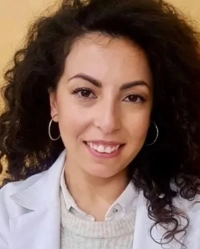 The goal of becoming an independent academic scientist came into focus during my PhD in Dr. Viola Calabrò’s lab at the University of Naples, where I studied molecular pathways involved in cancer development. My PhD resulted in 3 first-author papers and a short-term EMBO fellowship at the Karlsruhe Institute of Technology. Towards the end of my PhD, I developed a burgeoning interest in malignant hematopoiesis. So, for my post-doctoral studies, I joined the laboratory of Dr. John S. Welch at Washington University in St Louis (WashU) – a world-renowned institute in leukemia biology. At WashU, I have demonstrated how nuclear receptors can represent a valuable therapeutic target in Acute Myeloid Leukemia therapy, which resulted in 3 first-author papers and co-authors of several others in leading journals in hematology. After my postdoc, I was appointed as an Instructor in the hematology/oncology division at WashU, joining Dr. Stephen Sykes’ lab to study hematopoietic stem cell function and leukemia pathogenesis. As an Instructor, I earned prestigious awards, including the ASH Fellow to Faculty Award and the SPORE Leukemia Grant. My work has been featured at international events, such as the ASH meetings and FASEB Conference. In January 2023, I was promoted to Assistant Professor of Pediatrics at WashU and secured a Tenure-Track position at the University of Parma. Recently, I received the ambitious AIRC Start-Up Grant, enabling me to establish a highly competitive independent research group at Parma.
The goal of becoming an independent academic scientist came into focus during my PhD in Dr. Viola Calabrò’s lab at the University of Naples, where I studied molecular pathways involved in cancer development. My PhD resulted in 3 first-author papers and a short-term EMBO fellowship at the Karlsruhe Institute of Technology. Towards the end of my PhD, I developed a burgeoning interest in malignant hematopoiesis. So, for my post-doctoral studies, I joined the laboratory of Dr. John S. Welch at Washington University in St Louis (WashU) – a world-renowned institute in leukemia biology. At WashU, I have demonstrated how nuclear receptors can represent a valuable therapeutic target in Acute Myeloid Leukemia therapy, which resulted in 3 first-author papers and co-authors of several others in leading journals in hematology. After my postdoc, I was appointed as an Instructor in the hematology/oncology division at WashU, joining Dr. Stephen Sykes’ lab to study hematopoietic stem cell function and leukemia pathogenesis. As an Instructor, I earned prestigious awards, including the ASH Fellow to Faculty Award and the SPORE Leukemia Grant. My work has been featured at international events, such as the ASH meetings and FASEB Conference. In January 2023, I was promoted to Assistant Professor of Pediatrics at WashU and secured a Tenure-Track position at the University of Parma. Recently, I received the ambitious AIRC Start-Up Grant, enabling me to establish a highly competitive independent research group at Parma.
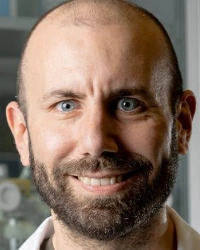 After graduating in Medical Biotechnology at the University of Naples Federico II, I joined the PhD program in Experimental Medicine at Sapienza University of Rome in 2011, where I had the opportunity to study the mechanisms of therapy resistance in human cancers, with a particular emphasis on translational research. During my PhD and later during my postdoctoral training, I spent two research periods in the USA in the laboratory of Professor Croce at Ohio State University in Columbus, Ohio. This experience was a fundamental crossroads in my career, both personally and scientifically. It was there that I began my journey, which continues to this day, in the field of microRNAs whose discovery was awarded the 2024 Nobel Prize in Physiology or Medicine. My research focuses on understanding the molecular mechanisms governed by microRNAs and exploring their therapeutic and diagnostic implications to overcome therapy resistance in various tumors, particularly metastatic melanoma. After completing my PhD, I obtained several postdoctoral fellowships funded by AIRC, Fondazione Veronesi, and Istituto Pasteur Italia, allowing me to work in different non-academic institutions, such as the IRCCS Regina Elena Institute in Rome and the Pascale Institute in Naples. During my career, I had also the opportunity to serve as a junior adviser for the SIBBM society from 2016 to 2022. After serving as a researcher at the Regina Elena Institute since 2020, in 2024, I became an Associate Professor of Molecular Biology at LINK Campus University in Rome.
After graduating in Medical Biotechnology at the University of Naples Federico II, I joined the PhD program in Experimental Medicine at Sapienza University of Rome in 2011, where I had the opportunity to study the mechanisms of therapy resistance in human cancers, with a particular emphasis on translational research. During my PhD and later during my postdoctoral training, I spent two research periods in the USA in the laboratory of Professor Croce at Ohio State University in Columbus, Ohio. This experience was a fundamental crossroads in my career, both personally and scientifically. It was there that I began my journey, which continues to this day, in the field of microRNAs whose discovery was awarded the 2024 Nobel Prize in Physiology or Medicine. My research focuses on understanding the molecular mechanisms governed by microRNAs and exploring their therapeutic and diagnostic implications to overcome therapy resistance in various tumors, particularly metastatic melanoma. After completing my PhD, I obtained several postdoctoral fellowships funded by AIRC, Fondazione Veronesi, and Istituto Pasteur Italia, allowing me to work in different non-academic institutions, such as the IRCCS Regina Elena Institute in Rome and the Pascale Institute in Naples. During my career, I had also the opportunity to serve as a junior adviser for the SIBBM society from 2016 to 2022. After serving as a researcher at the Regina Elena Institute since 2020, in 2024, I became an Associate Professor of Molecular Biology at LINK Campus University in Rome.
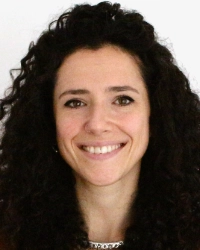 Marzia obtained her undergraduate degree in Biology and Master's degree in Genetics and Molecular Biology from Sapienza University. She graduated in 2015 with a master thesis on long non-coding RNAs in neuronal development in the group of Prof. Irene Bozzoni. Then, she worked as a Research Assistant in Prof. Richard Gregory's lab at the Boston Children's hospital, where she investigated the molecular mechanisms of RNA quality control in mouse Embryonic Stem Cells. In 2016, she joined Prof. Greg Hannon's lab at the University of Cambridge for her PhD, during which she investigated the mechanisms of transposon silencing mediated by small RNAs in the fly ovary. Since September 2020, she is a postdoctoral fellow in Dr. Jamie Hackett's group at the European Molecular Biology Laboratory in Rome, where she studies mammalian oocyte epigenetics.
In parallel with her activity as a scientist, since 2020 she is also a scientific illustrator. She created cover arts and illustrations for leading journals and laboratories worldwide, using unconventional visuals to depict and communicate science.
Marzia obtained her undergraduate degree in Biology and Master's degree in Genetics and Molecular Biology from Sapienza University. She graduated in 2015 with a master thesis on long non-coding RNAs in neuronal development in the group of Prof. Irene Bozzoni. Then, she worked as a Research Assistant in Prof. Richard Gregory's lab at the Boston Children's hospital, where she investigated the molecular mechanisms of RNA quality control in mouse Embryonic Stem Cells. In 2016, she joined Prof. Greg Hannon's lab at the University of Cambridge for her PhD, during which she investigated the mechanisms of transposon silencing mediated by small RNAs in the fly ovary. Since September 2020, she is a postdoctoral fellow in Dr. Jamie Hackett's group at the European Molecular Biology Laboratory in Rome, where she studies mammalian oocyte epigenetics.
In parallel with her activity as a scientist, since 2020 she is also a scientific illustrator. She created cover arts and illustrations for leading journals and laboratories worldwide, using unconventional visuals to depict and communicate science.
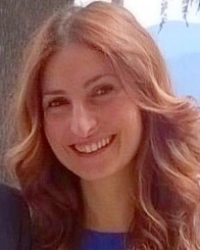 Dr. Ortensia Ilaria Parisi is a Researcher at the Department of Pharmacy, Health and Nutritional Sciences of University of Calabria, Italy. She earned her Master’s Degree in Pharmaceutical Chemistry and Technology in 2007 and completed her Ph.D. in “Environment, Health and Eco-friendly Processes” in 2011, both at the University of Calabria.
Dr. Ortensia Ilaria Parisi is a Researcher at the Department of Pharmacy, Health and Nutritional Sciences of University of Calabria, Italy. She earned her Master’s Degree in Pharmaceutical Chemistry and Technology in 2007 and completed her Ph.D. in “Environment, Health and Eco-friendly Processes” in 2011, both at the University of Calabria.
Her research is dedicated to the design, synthesis, and characterization of polymeric materials for pharmaceutical and biomedical applications, with a particular focus on Molecularly Imprinted Polymers.
Dr. Parisi is also a co-founder of Macrofarm s.r.l. and Arcadia s.r.l.s., two spin-off companies of the University of Calabria, and has contributed as an inventor to several patents.
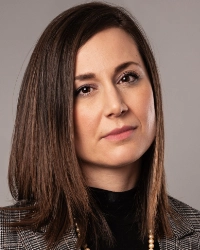 Dr. Francesca Rocchio is an accomplished Molecular and Cellular Biologist with over a decade of experience in academic research and pharmaceutical R&D. She currently works as a Discovery Biology Specialist at Dompè farmaceutici S.p.A., where she specializes in translational biomarker discovery and assay development to bridge preclinical and clinical drug discovery phases.
Dr. Francesca Rocchio is an accomplished Molecular and Cellular Biologist with over a decade of experience in academic research and pharmaceutical R&D. She currently works as a Discovery Biology Specialist at Dompè farmaceutici S.p.A., where she specializes in translational biomarker discovery and assay development to bridge preclinical and clinical drug discovery phases.
Her expertise in multidisciplinary translational research enables her to lead project teams and promote collaborations with global partners, universities and CROs to drive therapeutic advancements.
Prior to her industry role, Dr. Rocchio held multiple postdoctoral research positions at esteemed Italian institutions, including the University of Perugia, Sapienza Università di Roma, the University of Milan and Università del Piemonte Orientale. Her research has encompassed a broad spectrum of biomedical fields, including acute myeloid leukemia, diabetic kidney disease, neuroimmune interactions in hypertension and astroglial signaling in Alzheimer’s disease.
Dr. Rocchio earned her Ph.D. in Pharmaceutical and Food Biotechnologies from Università del Piemonte Orientale, where she investigated RNF168-dependent DNA damage signaling. She also holds an M.Sc. in Molecular and Cell Biology from the University of Siena and a B.Sc. in Biotechnology from the University of Perugia.
A contributor to high-impact scientific publications and international conferences, Dr. Rocchio is dedicated to translating fundamental scientific discoveries into clinical applications, advancing innovation in drug development.
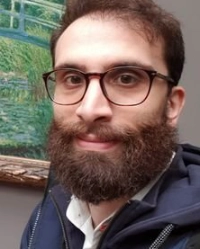 Emanuele Sasso took his master’s degree with a final grade of 110/110 cum laude and studies achievement award in medical biotechnology in 2013 discussing a thesis on hypoxic tumor niche.
After his master’s degree he was enrolled at Okairos srl biotech (Rome, Italy) to isolate monoclonal antibodies by Next Generation Sequencing platform technologies.
Emanuele Sasso took his master’s degree with a final grade of 110/110 cum laude and studies achievement award in medical biotechnology in 2013 discussing a thesis on hypoxic tumor niche.
After his master’s degree he was enrolled at Okairos srl biotech (Rome, Italy) to isolate monoclonal antibodies by Next Generation Sequencing platform technologies.
He continued his studies in Molecular Biotechnology at University of Naples (Italy) Federico II, where in 2017 he obtained a PhD in Molecular Medicine and Medical Biotechnologies defending a PhD thesis about the development of oncolytic viruses.
After PhD, he joined as immune-oncologist scientist Nouscom srl Biotech (Basel and Rome) developing adenoviral vectors for personalized cancer vaccines in preclinical models and in phase I clinical trials.
Now he is assistant professor at university of Naples Federico II (Italy). His research still focuses on development on novel immune therapeutics based on RNA vaccines, viral vectors and monoclonal antibodies. From 2024 Emanuele Sasso co-founded and is chief scientific officer of the innovative start-up Imgen-T aimed to develop a next-gen RNA vaccines and gene therapy platforms.
He is the main author of over 30 scientific publications and inventor or owner of several patents.
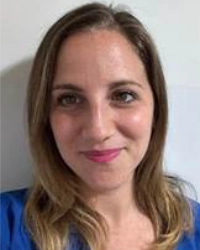 Chiara Papulino, PhD is a researcher in General Pathology at the University of Campania "Luigi Vanvitelli," specializing in precision medicine and cancer epigenetics. She earned her PhD in Translational Medicine with honors in 2022, focusing on epigenetic reprogramming in colorectal cancer. Her research encompasses metabolic remodeling in cancer, epigenetic mechanisms of tumor resistance, and drug repurposing. She has authored multiple high-impact publications and actively collaborates on national and international research projects. She is also the co-founder and CEO of CIRCE srl, an academic spin-off of Università Campania “Luigi Vanvitelli” dedicated to developing innovative oncological therapies. CIRCE activity consists of the design and subsequent in vitro and in vivo testing of proprietary and third-party molecules through rational synthesis and pro-drug delivery processes—products that hold commercial value in the biotechnology R&D landscape.
Chiara Papulino, PhD is a researcher in General Pathology at the University of Campania "Luigi Vanvitelli," specializing in precision medicine and cancer epigenetics. She earned her PhD in Translational Medicine with honors in 2022, focusing on epigenetic reprogramming in colorectal cancer. Her research encompasses metabolic remodeling in cancer, epigenetic mechanisms of tumor resistance, and drug repurposing. She has authored multiple high-impact publications and actively collaborates on national and international research projects. She is also the co-founder and CEO of CIRCE srl, an academic spin-off of Università Campania “Luigi Vanvitelli” dedicated to developing innovative oncological therapies. CIRCE activity consists of the design and subsequent in vitro and in vivo testing of proprietary and third-party molecules through rational synthesis and pro-drug delivery processes—products that hold commercial value in the biotechnology R&D landscape.
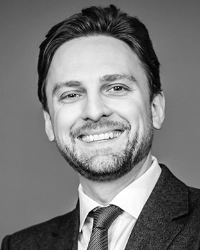 Michael Jewett holds a PhD in Biomedicine from Lund University in Sweden. During his doctoral studies, he discovered a passion for scientific communication, recognizing his ability to translate complex biomedical concepts into clear and accessible information. He believes that effective storytelling is essential in making science engaging and impactful, helping bridge the gap between scientific research and industry, as well as the general public. This passion led him to his current role as editor and studio reporter for BioStock, a digital media company based in Lund, Sweden, delivering news and analyses for industry professionals and investors in the biopharma and medtech sectors of the Nordic region.
Michael Jewett holds a PhD in Biomedicine from Lund University in Sweden. During his doctoral studies, he discovered a passion for scientific communication, recognizing his ability to translate complex biomedical concepts into clear and accessible information. He believes that effective storytelling is essential in making science engaging and impactful, helping bridge the gap between scientific research and industry, as well as the general public. This passion led him to his current role as editor and studio reporter for BioStock, a digital media company based in Lund, Sweden, delivering news and analyses for industry professionals and investors in the biopharma and medtech sectors of the Nordic region.
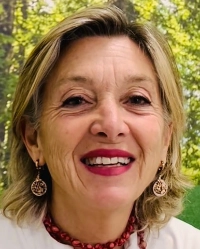 Interpreter and translator of English and German, she holds a Bachelor's Degree in Languages and a Master’s Degree in Communication Sciences from Roma Tre University. She has earned several postgraduate qualifications, including a Master in Patient Advocacy Management (Catholic University scholarship, 2023/24), the European EURORDIS Master in Medicines Research & Development (2024), and a Master in EU Project Design (European Studies Center of Bologna and Sapienza University of Rome).
Interpreter and translator of English and German, she holds a Bachelor's Degree in Languages and a Master’s Degree in Communication Sciences from Roma Tre University. She has earned several postgraduate qualifications, including a Master in Patient Advocacy Management (Catholic University scholarship, 2023/24), the European EURORDIS Master in Medicines Research & Development (2024), and a Master in EU Project Design (European Studies Center of Bologna and Sapienza University of Rome).
From 2013 to 2024, she served as President of Biostella s.r.l., a biotechnology consulting firm, where she continues to be active as a founding partner, overseeing administrative management and event organization.
In 2016, she founded NAnA ETS, a nonprofit association registered with the RUNTS, where she serves as President. The organization supports research on adolescent leukemia and promotes education for disadvantaged students.
Since 2009, she has collaborated with the Master’s program in Languages and Tourism Management at Roma Tre University. Her experience spans interpreting, translation, editorial coordination, event organization, and university-level teaching. She has worked with organizations such as Triumph Group, IRBM, FISV, and the Non-Catholic Cemetery of Rome.
She has also volunteered as a member of school councils in both Italian and international schools, including Mutchmor Elementary School and Goodmorning Preschool (Canada), Liceo Classico T. Tasso, and the Swiss School of Rome, where she served on the Board of Directors.
On November 13, 2024, she was awarded the Romei Prize 2024.
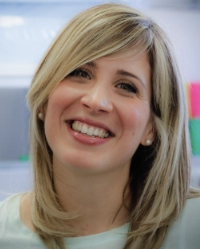 I am currently an Associate Professor and PI at the University of Padova (Department of Industrial Engineering), Group Leader at the Veneto Institute of Molecular Medicine, and hold an Honorary Position at University College London (Developmental Biology & Cancer Department, UK).
I am currently an Associate Professor and PI at the University of Padova (Department of Industrial Engineering), Group Leader at the Veneto Institute of Molecular Medicine, and hold an Honorary Position at University College London (Developmental Biology & Cancer Department, UK).
I have more than 10 years of experience in developing technologies to control cell behaviour by precisely defining the local microenvironment with a combination of biochemical and biophysical cues. My overarching research interest lies in the development of microtechnologies,including lab-on-chip platforms, to dynamically balance these stimuli in space and time, enabling high-content experimentation and high-throughput readouts.
I have made significant contributions to the field by developing microfluidic approaches for cellular reprogramming, which enabled the generation of both naïve and primed hiPSCs in a scalable and cost-effective manner. I am an expert in engineering the cell microenvironment and in synchronizing peripheral biological oscillators. I have designed technologies to control both extrinsic and intrinsic cellular signals, using morphogen gradients in combination with transcription factors to guide iPSC differentiation into specific phenotypes, including neural lineages.
Recently, I contributed to the development of ECM-hydrogel-based 3D culture systems tailored for naïve and primed hiPSCs and 3D organoids, achieving spatiotemporal control over self-organization.
In 2023, I was awarded an ERC Starting Grant for the project “Engineering the Origin of Human Shape: Defining Patterns and Axes in the Early Stage of 3D Pluripotency.” This work aims to engineer an in vitro neural tube model by integrating smart microfluidic and hydrogel-based technologies.
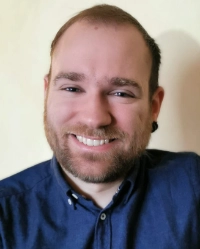 Jacopo Sacquegno is a Molecular Biologist by training and has always been passionate about life and natural sciences. Parallel to this, however, he also developed a passion for drawing, visual synthesis, and conceptual diagrams. Today he combines the two and works with science and visual language together. His profession is in fact that of “Visual Thinking Practitioner.” To put it in simpler words, a “designer of ideas”: through sketches, doodles and large illustrated visual maps, he divulges and communicates the concepts and methods of science. He also has to his credit numerous collaborations with researchers, universities, companies and associations to provide visual support for their communication activities in science and technology.
Jacopo Sacquegno is a Molecular Biologist by training and has always been passionate about life and natural sciences. Parallel to this, however, he also developed a passion for drawing, visual synthesis, and conceptual diagrams. Today he combines the two and works with science and visual language together. His profession is in fact that of “Visual Thinking Practitioner.” To put it in simpler words, a “designer of ideas”: through sketches, doodles and large illustrated visual maps, he divulges and communicates the concepts and methods of science. He also has to his credit numerous collaborations with researchers, universities, companies and associations to provide visual support for their communication activities in science and technology.